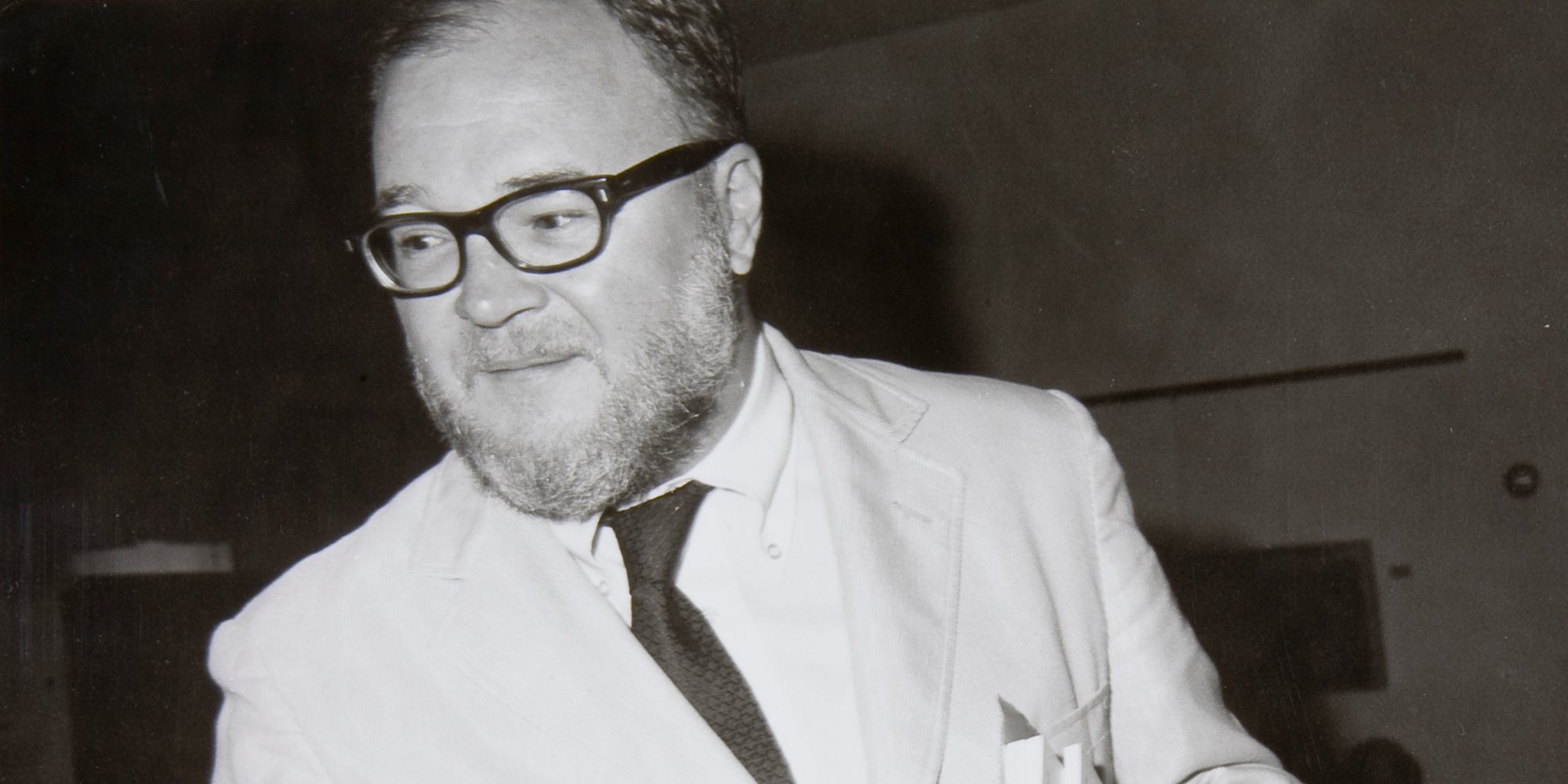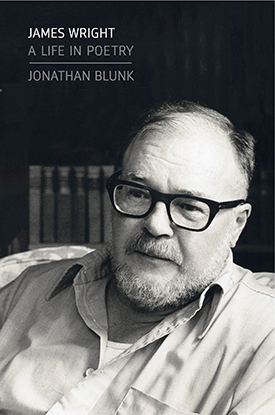I am still amazed to recall that everyone I spoke with while researching James Wright: A Life in Poetry could remember the poet so vividly. His physical presence in the room, his astonishing capacity for reciting poetry and prose from memory, and the quality of his literal voice: those I interviewed could share distinct impressions of Wright decades after his death. Wright died of cancer at the age of fifty-two in March 1980, and the suddenness of his illness prevented me from meeting the poet. But I had already fallen under the spell of his poetic voice and the undeniable authority that lives on in his work—what John Haag has called the “impetus, the poet’s energy flowing through the forms.” Stanley Kunitz agreed, praising “the manifestation of his spirit, that psychic energy that flowed from [Wright] and that continues to flow from his poems.”
One of my primary goals in the biography has been to capture Wright’s voice and thereby give to readers strong, clear glimpses of the poet. In the early stages of my twenty years of research, I began gathering and transcribing audio recordings of Wright’s readings and interviews, so his physical voice has long sounded in my ears. By focusing on Wright’s presence in the classroom as a teacher and on stage as a reader of poems, I have hoped to reveal the more enduring voice he created in his work—the unmistakable qualities of passionate engagement and human sympathy that distinguish his poetry.
On November 28, 1978, Wright gave what proved to be his penultimate reading, at the Guggenheim museum in New York City, and to me it seems one of the best of his career. Throughout, he is focused and yet relaxed, reciting poems drawn entirely from the last book he saw into print, To a Blossoming Pear Tree (1977). Mark Strand’s introduction showed his deep appreciation for the poet, noting that the work is distinguished by its honesty and conviction, free of melodrama or posturing. “There is always a wonderful naturalness about his writing, and that’s part of the sincerity,” Strand would later tell me. “You’re reading literature but you’re also as close to a man’s soul as you’ll ever get. You really feel you’re near the source of poetry, where it’s born.”
“You’re reading literature but you’re also as close to a man’s soul as you’ll ever get. You really feel you’re near the source of poetry, where it’s born.”
Wright demurred after hearing Strand’s praise that evening, finding opportunities to joke about himself. His demeanor and even the timbre of his voice seem markedly different from earlier in the decade, when the poems of Two Citizens (1973) often struck a confrontational stance. The poems from Pear Tree propose a dialogue instead, and are distinguished by inquisitiveness and openness. In his reading of “The Wheeling Gospel Tabernacle,” the phrase “For all I know” becomes a kind of musical refrain. Introducing his poem for Etheridge Knight, “On a Phrase from Southern Ohio,” Wright marvels at the strange idiom they had both heard in childhood: “Damned if you know; / I don’t.” His new poems acknowledged this state of uncertainty, with their shifts in tone and diction embodying a searching quality and sense of openness that helped win the trust of his audience.
Near the end of the reading, Wright recited a prose piece inspired by Horace, “How Spring Arrives,” which he introduced by saying from memory one of Horace’s famous odes. In a Roman park in autumn, Wright had watched three girls delighting in a warm afternoon, chattering in “their liquid Italian” as one after another they took off their sweaters. Seated in a bench across from them, Wright had suddenly recalled Horace’s poem about the coming of spring, with the lines, “The Nymphs and Graces three put off their fear / And unapparelled in the woodland play.” In a self-deprecating aside, Wright called himself “a bookish person—worse than Don Quixote,” and confessed to transposing his own poem to springtime. Rather than challenging Horace in verse, Wright had decided to draft the piece as prose.
In the recording of it that fall evening in New York, Wright’s voice bears down hard on the end of the first paragraph, uttering the sentence as though pronouncing a curse: “The dead loiter indecently here in the fresh sunlight, bound and determined to get revenge on somebody if it’s the last thing they ever do.” With the turn to the following sentence—“Three girls are coming up the path”—Wright’s voice embodies the change in season with a change in tone, a moment of sudden joyfulness that seems to capture the shift taking place in his own poetry.
Wright’s voice embodies the change in season with a change in tone, a moment of sudden joyfulness that seems to capture the shift taking place in his own poetry.
In Wright’s late poetry there is a concurrent renewal of his first love, the Latin poets he had read in high school. With his command of languages returning as sharp as it had been before the burden of alcohol, Wright felt empowered and more in command of his craft. The poems he wrote in Europe have ready access to the landscape and emotional depths of his Ohio, a simultaneity made possible by the keen accuracy of his memory. When he gave his final reading at Harvard College in October 1979, Wright introduced new poems from the collection published posthumously as This Journey (1982), unaware then of the cancer that would shortly take his life:
I find myself going back to Ohio, again and again, with some
affection. I’ve written kind of harshly about the place at times,
and I have troubled some people in my hometown back in Martins
Ferry, Ohio. They thought I was just attacking the place. That
wasn’t it. It was, and is to me still, an important American place.
On Saturday, April 21, 2018, the James Wright Poetry Festival will reconvene in his hometown of Martins Ferry, Ohio, with a day-long celebration featuring numerous poets, Wright’s widow, Annie, and myself taking part. You can find more information here:
Jonathan Blunk is a poet, critic, essayist, and radio producer. His work has appeared in The Nation, Poets & Writers, The Georgia Review, and elsewhere. He was a co-editor of A Wild Perfection: The Selected Letters of James Wright.
This piece is adapted from an essay in the Winter 2017 issue of The Georgia Review titled “‘Living Toward That Voice’: James Wright Transfixing and Transfixed”).
The recording of “How Spring Arrives” is courtesy of the Academy of American Poets.

